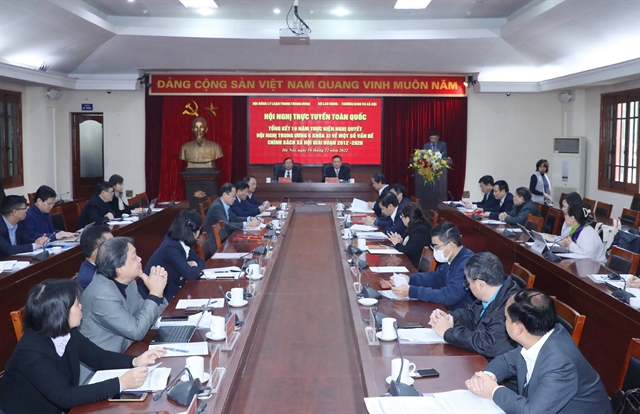 Politics & Law
Politics & Law


|
| Mông people in Kỳ Sơn District of central Nghệ An Province reap great benefits from growing tea, which provides a stable income source and helps lift them out of poverty. — VNA/VNS Photo Văn Tý |
HÀ NỘI — While social policies have resulted in significant achievements in the past few years, a more comprehensive approach is required to ensure social security and welfare for people.
The statement was made at a national seminar on Friday reviewing the decade-long implementation of social policies in the resolution of the fifth plenum of the 11th Central Committee, from 2012 to 2020.
The event was co-presided by deputy chairman of the Central Theoretical Council Phạm Văn Linh and Deputy Minister of Labour, Invalids and Social Affairs Lê Văn Thanh.
Linh said that Resolution No. 15-NQ/TW focused on addressing issues of two fundamental policy groups, which are for people with meritorious services and for social welfare.
Preferential policies for people with meritorious services have seen comprehensive implementation and achieved the goals set out in the resolution.
Showing gratitude for veterans has become a movement with regular activities at the central to grassroots levels.
Social security policies have also seen positive progress despite limited resources.
The mission set out by the Party and the State is to ensure social development in harmony with economic growth, as well as investments in economy and social welfare.
Multiple programmes on job creation and poverty reduction have been well-conducted, bringing in good results and international recognition.
A recent report by the United Nations Development Programme (UNDP) said that Việt Nam’s extreme poverty rate fell from 49 per cent in 1992 to 5 per cent in 2021.
Meanwhile, according to the new multidimensional poverty line, the country’s current multidimensional poverty rate is at just over 9 per cent.

|
| Delegates at the event. — VNA/VNS Photo Phương Hoa |
Deputy Minister Thanh added that in recent years, all Party officials of every level have proactively reviewed the quality of resolution implementation process in accordance with requirements, of which reports were compiled and timely submitted to the resolution’s steering committee.
The committee hosted research activities, seminars and field studies for the assessment.
It also worked with local offices of the United Nations, the International Labour Organisation, the World Bank, the Central Theoretical Council, and Hồ Chí Minh National Academy of Politics in multiple conferences that review and identify new issues, while also proposing perspectives, goals and missions for social policies to 2030, with a vision to 2045.
Some of the areas needing improvement in these policies include practicality, inclusivity, and coordination to ensure the balance of interests, social relations, risk management and conflict control.
These shortcomings need to be addressed to implement the direction of the 13th Party Central Committee, which emphasised “ensuring social welfare, human security, creating a powerful transformation in social development management, social progress and justice, improving people’s quality of life and happiness.”
At the event, delegates also discussed the actual situation and provided suggestions for the draft report, which identifies key issues to address by 2030, with a vision to 2045. — VNS




